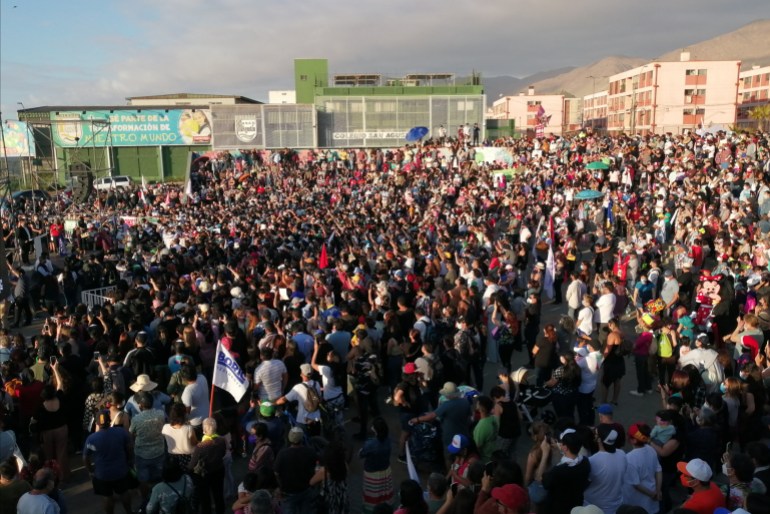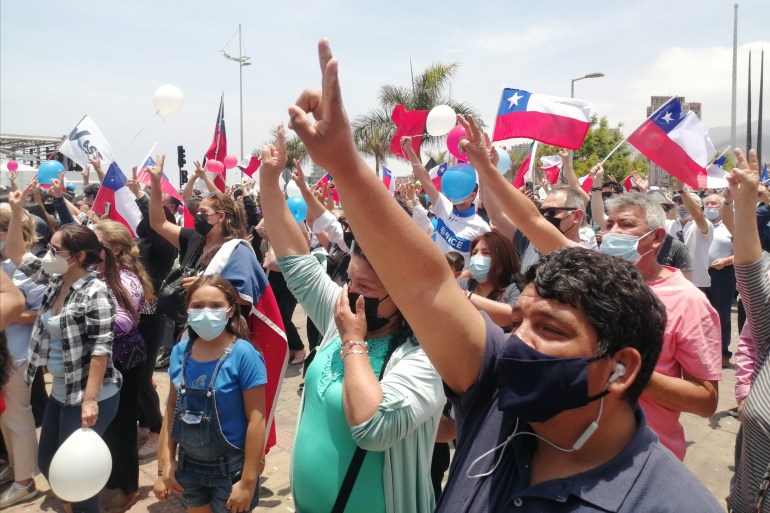Chile to elect its next president as ‘very close race’ wraps up | Elections News
Antofagasta, Chile – Chileans will elect their next president this weekend – and the country’s north will prove key, analysts say, as two very different candidates compete to win over centrists and disaffected voters.
The runoff election on Sunday pits Jose Antonio Kast, a far-right conservative, against Gabriel Boric, a progressive social democrat, and the president-elect will take office on March 11 next year.
Kast, a 55-year-old lawyer and former congressman, garnered more votes in the first-round election last month, but Boric, a 35-year-old congressman and former student activist, has since been leading in recent polls.
Voter turnout – and particularly how many younger voters show up – could dictate the election outcome; Kast has the advantage with voters over age 50, while voters under 30 favour Boric.
“I think a lot of people understand the importance of this election,” said Daniela Campos Letelier, a member of the Red de Politologas, a network of female political scientists.
In their runoff campaigns, both candidates have appealed more to the centre in an attempt to win over a large pool of voters neither secured in the first round. But only one candidate had to shake up his platform, said Campos Letelier.
“The core of [Boric’s] programme remains the same,” she told Al Jazeera. “[Kast] has had to move the compass needle a lot more.”
The Christian Social Front coalition candidate, Kast champions law and order, government downsizing, and tax breaks to encourage investment. He was walked back some of the more unpopular points of his initial platform, including privatisation of the Codelco state copper company and elimination of the Ministry of Women.
He also has been making a concerted effort to present himself as a tolerant democrat, but remains plagued by his anti-LGBTQ track record, misogynistic remarks by recently elected legislators from the party he founded, and his esteem for the 1973-1990 dictatorship of Augusto Pinochet.
“Hard times are coming, and a government that provides stability is required … a government that exercises prudence and authority,” Kast said on Monday night during the final presidential debate.
Boric, the left-wing Apruebo Dignidad coalition candidate, has focused on social change, promising to overhaul the pension system, advance LGBTQ and women’s rights, tackle climate change, and increase mining royalties and corporate taxes. But he has also moderated his discourse in advance of the runoff to appeal to centrists.
“Stability is achieved with social justice,” Boric said in his final message during the debate, inviting viewers to vote for him to support “a profound transformation so that we may have more justice and dignity”.
Battle for the north
Voter turnout will be critical. Three-quarters of Chile’s more than 15 million registered voters did not vote for either candidate last month. More than half did not participate at all, and more than 45 percent of those who did cast a ballot, voted for one of the other five candidates now out of the running.
Those trends ran even deeper in Antofagasta, the most populous region in northern Chile, where turnout was 5 percent under the national average and outsider candidate Franco Parisi won with nearly 34 percent. Kast and Boric finished both just shy of 21 percent support.
Parisi, an economist who lives in the United States, campaigned without setting foot in Chile, where he faces legal action for failure to pay child support. Chile’s election authority is now investigating his party for alleged irregularities in campaign spending.
“I voted for him,” Antofagasta resident Maria Morales said of Parisi, but she scoffed at international media reports suggesting he would be the “kingmaker” of the runoff election.
 More than 1,000 people attended presidential candidate Gabriel Boric’s rally on December 14 in Antofagasta, northern Chile [Sandra Cuffe/Al Jazeera]
More than 1,000 people attended presidential candidate Gabriel Boric’s rally on December 14 in Antofagasta, northern Chile [Sandra Cuffe/Al Jazeera]“It was a ‘punishment vote’ because all the politics in Chile have done nothing for us,” she told Al Jazeera in the city of Antofagasta, more than 1,300 kilometres (808 miles) north of Santiago, the capital.
Carlos Pizarro, a small business owner in Antofagasta, said has supported Kast from day one, but he also thinks Parisi’s support in the north was largely an expression of discontent. Antofagasta is the top region for mining, which drives Chile’s economy, but residents do not see that reflected in local development.
“People are disenchanted with presidents who govern from Santiago,” Pizarro told Al Jazeera at the tail end of a rally of roughly 200 Kast supporters who turned out for his visit to the city earlier this month.
Pizarro is in favour of decentralisation but said Chile first needs the law and order Kast is promising. The protests that rocked the country in October 2019 and continued for months severely affected many small businesses, he said.
“There is a lot of disorder,” said Pizarro. “Once we have order, we can achieve other things.”
‘Tight race’
The Kast rally on December 5 was not without commotion in Antofagasta.
As soon as Kast began his speech on stage, a small group of mostly LGBTQ high school and university students unfurled a protest banner at the back of the rally and used a megaphone to rail against Kast and the far right.
Kast supporters verbally and physically pushed back, and Carabineros police in riot gear moved in to form a line between the two groups. The protest continued, with students highlighting the dangers they said Kast’s candidacy represents for LGBTQ people, women, and human rights.
Kast opposes abortion under all circumstances and he consistently voted against LGBTQ rights while in Congress. “It affects us directly,” Izaac Jimenez, one of the student protesters, told Al Jazeera. “The ultra-right needs to be stopped.”
 Supporters of presidential candidate Jose Antonio Kast listen to him speak on December 5 in Antofagasta [Sandra Cuffe/Al Jazeera]
Supporters of presidential candidate Jose Antonio Kast listen to him speak on December 5 in Antofagasta [Sandra Cuffe/Al Jazeera]Jimenez and the other protesters, members of a local anti-capitalist student group, also are critical of Boric, his party and his programme. But they are calling for people to unite and vote for Boric in a campaign to defeat Kast and the far-right.
A diverse crowd of more than 1,000 Boric supporters rallied on Tuesday when he visited Antofagasta in one of the last stops on the campaign trail. Among the many key points he highlighted in his speech, Boric pledged full support for the constitutional convention process.
One of the key demands of the 2019 protests against structural inequality in Chile was to replace the country’s dictatorship-era constitution. Boric supported the demand, while Kast opposed it. A convention of elected citizen representatives is currently drafting a new constitution, and the next president will be in power when it is finished and put to a referendum.
“Let’s defend the advances we have made and opt for the proposal that defends the new constitution,” Elisa Loncon, an Indigenous Mapuche professor and president of the constitutional convention, said earlier this week.
Meanwhile, Boric and Kast have until Thursday night to win over more voters before there are two days of campaign silence ahead of Sunday’s election.
“I tend to think participation will be higher [than the first round],” said Campos Letelier, adding that if voter turnout is above 50 percent, the runoff would be a success. “I think it will be a very close race.”
